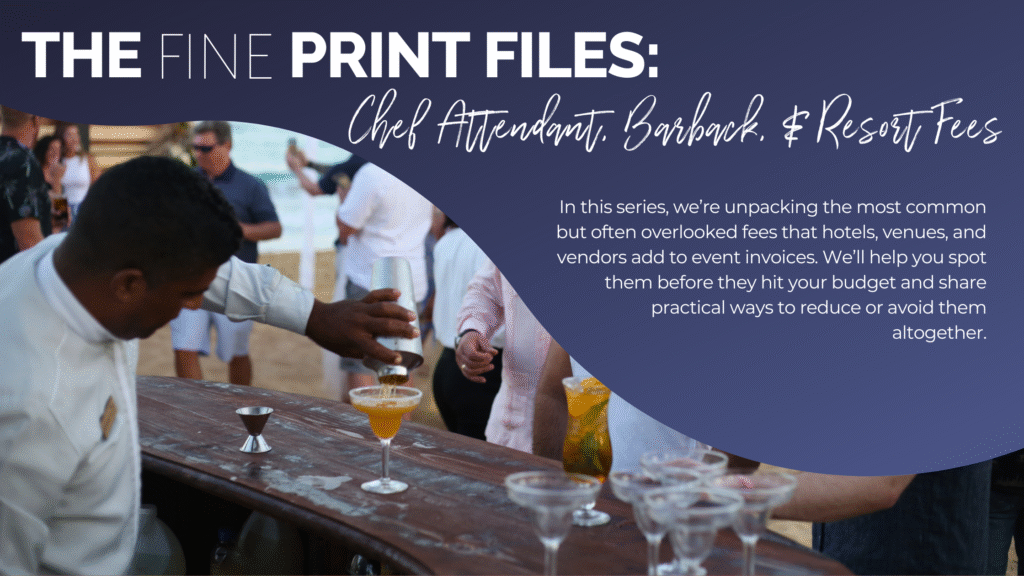
The Fine Print Files: Chef Attendant, Barback, & Resort Fees
Have you ever reviewed an event bill and found an unwelcome surprise? You’re not alone. In this series, we’re unpacking the most common but often overlooked fees that hotels, venues, and vendors add to event invoices. Whether it’s a mysterious service charge or a hidden setup fee, we’ll help you spot them before they hit your budget and share practical ways to reduce or avoid them altogether.
Chef Attendants

Tropical background not included.
A chef attendant brings interactive, experiential culinary service to your event. Instead of placing food on a buffet, the attendant prepares or finishes dishes in front of guests. This service can include carving meats like roast beef or turkey. It can also involve creating made-to-order omelets, sautéing pasta dishes, or assembling custom mac and cheese bowls. The attendant can support creative stations such as a French fry bar with unique dips and seasonings. These attendants offer culinary expertise and an elevated presentation. They also create a sense of luxury that many clients enjoy.
You do not need a chef attendant for an event, but certain dishes lose their appeal without personal preparation. A made-to-order station tastes better and looks more attractive when a trained attendant prepares each item individually. These attendants also help guests who have allergies or dietary preferences. Guests avoid feeling isolated by separate meals or awkward accommodations. They can simply ask the attendant to add or remove ingredients in a natural and inclusive way.
The fee for a chef attendant generally starts at $125 per chef and can increase depending on the property and the complexity of the station. The fee is part of the catering program, but it does not count toward your food and beverage minimum because it qualifies as staffing. Venues vary in what the fee includes. Some properties bundle gratuity into the cost, and others separate it, so you should ask in advance.

Keeping the margaritas flowing takes more work than it might look.
If you end the station early or change plans after the attendant is scheduled, the venue still charges the full fee. The venue staffs the position for the contracted time, so you remain responsible for the full cost. Negotiating this fee is uncommon because many clients sign venue contracts before finalizing their menus. You can request adjustments, but you need a clear plan for what you intend to serve.
Barbacks
Barbacks serve as the support system behind a seamless bar operation. While bartenders serve guests, barbacks handle the tasks that keep everything running efficiently. They replenish ice and restock wine, beer, and liquor. They replace kegs, refresh mixers, and keep glassware flowing. Barbacks add even more value at outdoor events where restocking requires extra effort and longer distances between service points. Their work allows bartenders to stay focused on guest interaction instead of leaving their stations to retrieve supplies.
A barback fee covers this labor and sometimes appears automatically in the bar package. Other venues list it as a separate line item. The number of barbacks you need depends on the number of bars, the guest count, and the layout of the space. The hotel typically determines the staffing ratio because every event has different needs. The barback fee remains separate from the bartender fee. Whether gratuity is included varies by property, and you should confirm this along with any service labor charges.

Enjoy the view! (You might have paid for it...)
If you shorten your cocktail hour or reduce bar hours, you will likely still pay for the hours guaranteed on your BEO. Some venues may have minimums, so double-check the details. If you plan to offer passed hors d’oeuvres, remember that many venues charge separate staffing fees for servers who circulate with trays.
Resort Fees
Resort fees are some of the most talked about and least understood costs on hotel contracts. A resort fee is a nightly charge that hotels add to guest rooms to cover specific amenities. These amenities can range from useful items like fitness center or pool access to less compelling inclusions like local phone calls or daily newspapers. Some amenities have changed as hotel loyalty programs evolve. Certain hotels even make the resort fee optional depending on the property.
You can sometimes negotiate or reduce resort fees for corporate events, and experienced planners often help secure adjustments during the contracting phase. The legality and regulation of resort fees continues to evolve, especially around whether hotels must disclose these fees clearly upfront. We believe it is always wise to request a detailed breakdown before signing anything.
For group events, hotels typically apply resort fees to each room within the contracted block unless you negotiate otherwise. Only guests staying on property have access to the amenities included in the fee, so attendees booked at other hotels may not be able to use the same facilities. Resort fees appear in the contract, and you should confirm whether the item is listed as resort fee plus tax or resort fee only. You should also watch for destination fees, which may be local taxes or separate amenity charges that differ from resort fees. Understanding both ensures that you know exactly what you are paying for.

We are here to help!
How to Manage All These Fees
Partnering with an experienced event designer, like Blue Spark Event Design, can make all the difference when it comes to managing venue costs. Our team knows how to navigate contracts, ask the right questions, and negotiate fair rates on your behalf. Even when certain fees cannot be eliminated entirely, we work to minimize their impact and handle the details so you don’t have to. By relying on our experience and industry relationships, you gain both cost savings and peace of mind—ensuring your event runs smoothly, efficiently, and without unnecessary stress.
